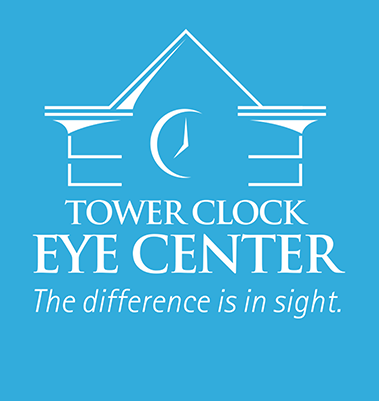Tower Clock Eye Center doctors are experts in treating dry eye syndrome, a chronic, common condition that affects a wide range of people, especially older adults.
During each blink the eye spreads tears around the cornea, or front-facing surface of the eye. These tears are the eye’s lubrication and maintain clarity. In addition, they wash away foreign debris and help prevent infection. Tower Clock Eye Center doctors work with each patient to develop a plan to treat dry eye syndrome.
View Video
Symptoms
Dry eye syndrome is usually experienced through an uncomfortable sensation in their eyes. Patients also often report:
- Burning, stinging feeling
- Redness or swelling
- Excessive eye tearing
- Sensitivity to light
- Eye secretions
- Blurred vision in severe cases
Causes
Tear production is a careful balance including several components and functions. If the parts that make up a tear are not correct, the quality of tears can cause eyes to become dry; if the processes of tear production and removal isn’t correct, dry eyes can result here as well.
Inadequate quality of tears – Tears consist of three components: oil, water and mucus. Each part of these tears is vital to healthy eyes. The oil prevents the water component from evaporating while the mucus part helps to spread the tears overly throughout the front part of the eye. Any disruption of these three layers often causes the eye to become dry.
Insufficient quantity of tears – Several glands around the eyes produce tears. As patients age, these glands produce fewer tears. Other factors that reduce tear production include medical conditions and/or medications, as well as environmental conditions (especially windy or dry areas). With an inadequate amount of tears comes the likelihood of dry eye syndrome.
Factors
Causes for dry eye syndrome varies, however there are some factors including:
- Gender: Women have a higher likelihood of developing dry eye than men.
- Age: As people age, eyes tend to become dryer. Those over 65 have a much higher likelihood of dry eyes than those younger in age.
- Medical conditions: Some medical conditions predispose those to dry eye syndrome including diabetes, rheumatoid arthritis and thyroid-related issues. Blepharitis is also a contributing factor to dry eyes.
- Medication: Several prescription and OTC medications can lessen tear production in the eyes including decongestants, blood pressure drugs, antidepressants and even common antihistamines.
- Eye health and previous surgeries: Eye surgery can be a precursor to dry eyes, this includes cataract surgery and LASIK. Also, contact lens use over time can affect dry eyes.
- Setting: Environmental surroundings such as wind, low humidity and smoke affect tear longevity and can cause reduced moisture in the eyes, as can staring at computer, tablet and phone screens for prolonged periods.
Diagnosis and treatment
Tower Clock Eye Center doctors provide a comprehensive eye exam to measure the quantity and quality of a patient’s tears. Each exam is tailored to the individual patient including a health history for existing conditions that may cause dry eyes, and a thorough exam of the structure of and around the eyes.
If diagnosed with dry eye syndrome our doctors will provide treatment options to improve eye comfort and health.
Mild forms of this disease can be treated with preservative-free over-the-counter artificial tears and consistent warm compresses, eyelid cleaners or eyelid massages. Staying hydrated and recognizing environmental factors are also simple ways to treat mild dry eye.
More severe forms of the disease are treated with prescription eye drops or punctal plugs, small silicone plugs that block the drain where tears usually flow away from the eyes. Keeping tears on the eyes longer maintains the eyes’ moisture. In some occasions, surgery can permanently close tear ducts.
Appointments
If you are experiencing dry eye symptoms, call Tower Clock Eye Center to schedule your dry eye exam at 920 499-3102.








